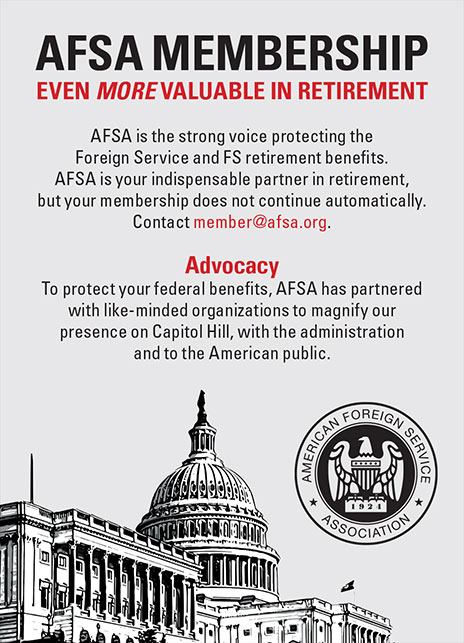Playing the “REA” Game—FS Work in Retirement
Re-employment as an annuitant is an important option for retirees. Here’s how it works.
BY LAWRENCE COHEN

Lawrence Cohen, at right, chats with Iraqis at Mam Halil’s chai shop in Erbil Bazaar during his WAE assignment to the Iraqi Kurdistan Region in 2013.
Courtesy of Lawrence Cohen
In return for devoting many years of challenging, often dangerous, service to the nation, Foreign Service members are eligible to retire while still young, healthy and up to date with professional skills. This allows us to pursue second (or third) careers, go back to school, take on part-time work, volunteer, chill out—or any combination thereof.
Following that last office retirement party, many former members of the Foreign Service want or need to continue working in some capacity. Specifically, many choose to use their personal and professional connections to line up annuitant work with the Department of State.
With that in mind, State created the When Actually Employed (WAE) program, which has now been renamed the Re-Employed Annuitant (REA) program. Recently, the Department of Commerce Foreign Commercial Service announced it would launch its own re-employed annuitant program, modeled on the State Department program. In this article I use the new term, REA, to refer to the State Department’s annuitant employment program.
Returning to Work
Eligible Foreign Service retirees may return to work, either overseas or stateside, in one or more positions for up to 1,040 hours in a year (the equivalent of half a full-time position), without any reduction in one’s pension. The one-year limitation begins on the date you start work as an REA. There is also an annual monetary cap (based on a calendar year): REA earnings plus annuity payments in any year must not exceed your final Foreign Service salary. Because annuitants receive no job benefits they may be considerably cheaper choices for State than active-duty FS members to fill vital personnel gaps.
These assignments may last anywhere from a few days to six months and can be personally, professionally and financially rewarding. As a bonus, they also help retirees maintain the government security clearances vital to securing other governmental employment opportunities (as a contractor, for example). The bureau that places the candidate on its roster is responsible for getting the clearance revalidated.
An REA posting enables retirees to serve at their convenience within a Foreign Service environment. These experienced personnel are also well-equipped to guide and mentor current Foreign Service members, including locally employed staff at overseas posts.
For all these reasons, a good REA assignment delivers both short-term achievement and positive long-term impact on the Foreign Service as an institution.
It’s Not What You Know…
While annuitant work is often a win-win proposition, the program is primarily designed to meet temporary, intermittent Foreign Service personnel gaps; and this is where FS retirees sometimes run into roadblocks.
In the State Department, each bureau manages its own roster of retirees through an REA coordinator. However, placement on a register does not mean an assignment will ever be offered. Moreover, retirees can only be on one bureau’s register at a time.
For retirees already on a bureau’s registry, this mechanism generally works smoothly—as long as funding is available when staffing needs arise. This is especially true for candidates who are willing to take assignments at hardship and danger-pay posts, or have a skill set or language ability in high demand. Overseas, short-term needs often arise in positions that affect a mission’s overall operations and have to be filled by capable people. Office management specialists, General Services officers and other management-coned specialties are in particularly high demand.
In addition, because staffing needs tend to surface unexpectedly or with little advance notice, bureaus are more comfortable with their own people and prefer to manage the process in-house. As a result, the bureaus have differing reputations for REA hiring. The Bureau for Consular Affairs, for example, reportedly has an effective, well-run program to fill numerous overseas vacancies and a strong roster of former consular-coned officers.
Retirees not on a bureau registry frequently express frustration with the current system. They cite a lack of transparency in the identification and selection process, the apparently arbitrary nature of placement on a bureau register, and the lack of any information about possible REA opportunities.
A Good Idea, but Needs Work
In an attempt to obviate these issues, State’s Human Resources Service Center maintains a centralized REA registry. Any State or FCS retiree, even if already listed on a bureau’s register, can sign up with the Service Center. This can be done by telephone in a few minutes.
Names on the HRSC register are available to all bureaus. However, since bureaus already maintain their own REA teams, they will look for candidates from their own register first. Even when an appropriate candidate for REA assignment is not available from within, bureaus may reach out to each other before going to the HRSC register.
After nearly three years since its establishment, HRSC’s central registry is still neither electronically accessible nor Internet searchable. Nor does it contain a curriculum vitae (CV) or employee profile database. HR does not appear to be encouraging bureau coordinators to consider retirees listed there, and there have been few examples of matchmaking success.
To be fair, the REA program is not intended to replicate the Foreign Service bidding process. It is not designed to eliminate selection bias or provide a level playing field for all—much less to offer all interested retirees part-time employment. The system's primary constituents are State Department bureaus and posts, and it serves them well.
Still, there is plenty of room for improvement. Creating a more robust central registry, one that makes retiree CVs easily accessible to bureau coordinators, would be a good place to start. At a minimum, the central registry should feature a searchable, keyword-driven résumé or profile system of the type common to the HR divisions of corporations, multilateral institutions and nongovernmental organizations everywhere.
The failure of the central registry to gain better traction is a disservice to both the Foreign Service and FS retirees. Highly skilled, experienced and motivated Foreign Service retirees will continue to be lost in the REA shuffle until that is fixed.
A Few Tips
In the meantime, here are some practical suggestions to maximize your chances of finding an REA assignment:
• Do not wait until your last day on the payroll to begin networking with REA coordinators in former bureaus. Many more potential candidates are available than there are REA opportunities, so being proactive is essential. Get your name out there.
• Try to link up with a bureau as early as possible to ensure that appropriate clearances do not lapse.
• Once on a bureau register, stay in touch with the bureau’s REA coordinator. Admittedly, visits to the department become more difficult after you have turned in your building access badge to Diplomatic Security, but a retiree badge will give you limited access.
• Consult the Career Transition Center’s Job Search Program and RNet for guidance in navigating the REA system.
• Be flexible about when and where you will work, without regard to rank or level of job responsibility.
• In addition to cultivating a relationship with the bureau where you want to work, sign onto the HRSC central registry. Even though REA opportunities via this mechanism may be slim, there is no downside to at least placing your name with HR. But put most of your energy toward working the bureau assignment.
• If you have questions or need contact information, consult AFSA’s “Re-Employed Annuitant Program Fact Sheet” at bit.ly/1SVvUZj.
• Finally, do not look at REA work as a retiree entitlement. It most definitely is not. Instead, consider it a potential backup, Plan B or C, while you follow through on your Plan A.






